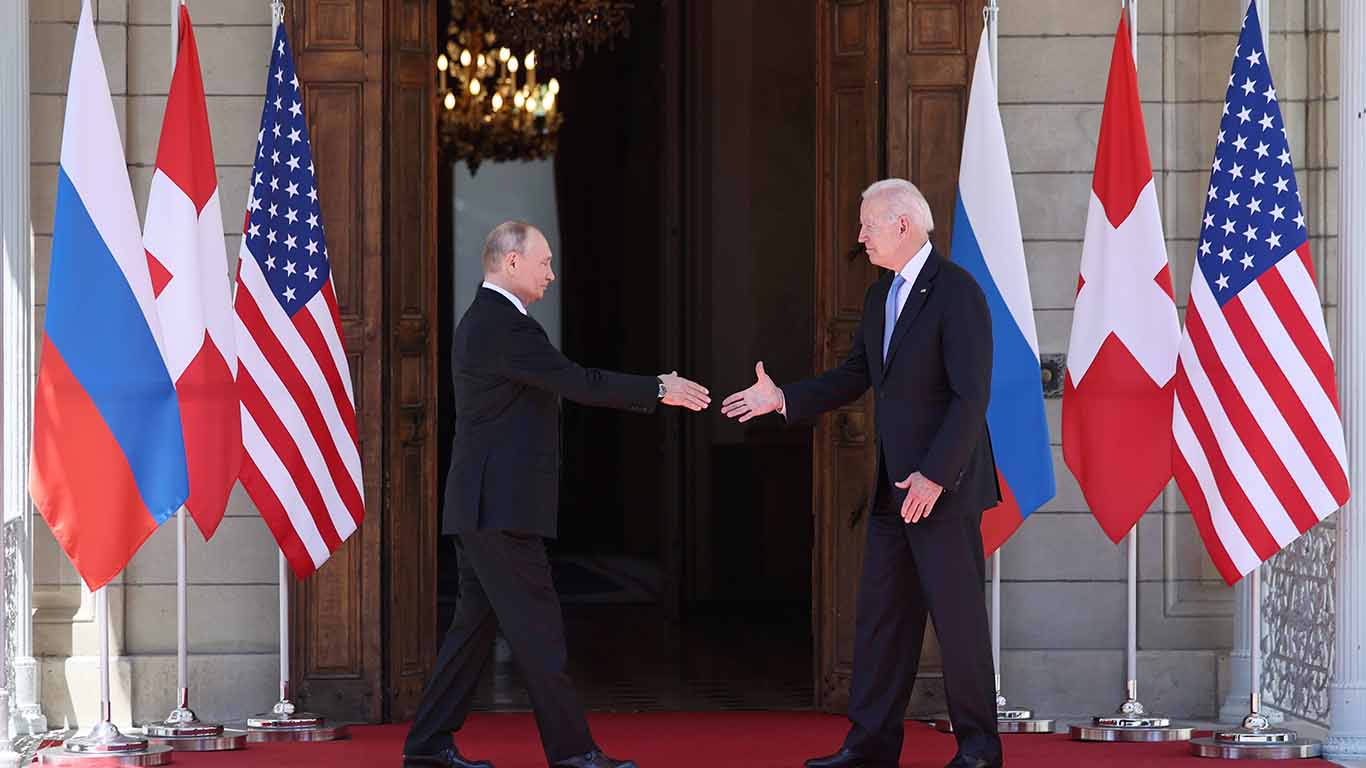DJOOMART OTORBAEV

BISHKEK – During their June 16 Geneva summit, Russian President Vladimir Putin reportedly offered US President Joe Biden the use of Russian military bases in Tajikistan and Kyrgyzstan in order to coordinate actions vis-à-vis Afghanistan. The Kremlin’s motives, of course, are not altruistic. Russia wants to prevent the United States from building its own bases in the region. But Putin’s offer is tempting, and Biden may well find a way to accept it.
Central Asia, a region nearly the size of the European Union nestled between Russia and China, is thus back in international headlines – again because of bad news, and again in connection with the violence and instability in Afghanistan. Biden’s decision to withdraw the remaining US troops from the country will bring to an end a 20-year war that has cost America nearly $2.3 trillion and failed to achieve any of its goals. And analysts now warn that the ongoing Taliban offensive could lead to full-scale civil war, a surge in drug trafficking, massive migration, and the spread of Islamic fundamentalism to neighboring countries.
The results of the US-led war were disastrous. According to official figures, 2,312 US military personnel have been killed, and 20,666 wounded, in Afghanistan since 2001. And more than 3,800 US private-security contractors have lost their lives.
But the Afghan people have suffered the most. According to the Costs of War project at Brown University, the conflict has killed at least 47,245 civilians and 66,000 to 69,000 Afghan troops. It has contributed to the total of 2.7 million Afghans forced to flee the country over the past four decades, mainly to Pakistan, Iran, and Europe, and it has left more than 3.5 million of Afghanistan’s 40 million people internally displaced.
With the US troop withdrawal almost complete, the Biden administration says it will continue to support the Afghan government from a distance in order to help contain the Taliban and other Islamist militant groups. But, in order to maintain a regional foothold, the US needs bases to house troops, drones, fighter jets, and artillery.
Among Afghanistan’s neighbors, neither Iran nor China will allow US bases on their territory under any circumstances. Pakistan has also resolutely rejected the idea. But America has previously had large airbases in some of Afghanistan’s Central Asian neighbors to the north – from 2001 to 2014 at Manas International Airport in Kyrgyzstan, and from 2001 to 2005 at the Karshi-Khanabad air base in Uzbekistan. (I was Kyrgyzstan’s deputy prime minister during the final year of the US presence at Manas.) The basing arrangements agreed with Russia’s strategic allies in Central Asia were made possible by a personal agreement between Putin and former US President George W. Bush. Now, Putin is extending a similar offer to Biden.
The US has few if any alternatives. Russian public opinion strongly opposes US plans to regain a foothold in Central Asia, and the Kremlin has reportedly warned the Central Asian countries that the US is more interested in containing Russia, China, and Iran than in maintaining control over the situation in Afghanistan. Russia further strengthened its position during recent talks in Moscow with high-ranking Taliban representatives, who promised that the group would not cross the borders of Central Asian states, would fight other radical Islamist groups, and would forbid drug production in Afghanistan.
At the same time, three Central Asian countries – Kazakhstan, Tajikistan, and Uzbekistan – are likely to refuse the Biden administration’s request that they temporarily host up to 10,000 at-risk Afghans who previously collaborated with US forces. Pakistani Prime Minister Imran Khan’s recent statement about the US-led invasion’s adverse effects on his country, which hosts 2.7 million Afghan refugees, has impressed other Central Asian leaders. As Russian Foreign Minister Sergey Lavrov stated bluntly in mid-June, “None of our allies [in Central Asia] have announced their intention to expose their territories and populations to such a risk.”
Everyone knows that only Putin can resolve the current impasse, and at the Geneva summit he made the first move. While the US and Russia had previously agreed on other issues without a presidential meeting, the situation in Afghanistan apparently required a face-to-face discussion. Biden, too, may well have realized that the Kremlin now holds the key to the continued US presence in Afghanistan.
All of the other issues on the summit’s agenda – cyber espionage, Ukraine, Iran, and Syria – were predictable and yielded no visible breakthroughs. The Biden administration must now decide whether to cooperate with Russia and its allies in Afghanistan. Putin’s proposal may give America the chance to save face and shore up its shaky international reputation following its hasty withdrawal. Most important, the US and Russia must aim to ensure a future free of conflict and chaos for Afghanistan’s long-suffering people.
No comments:
Post a Comment